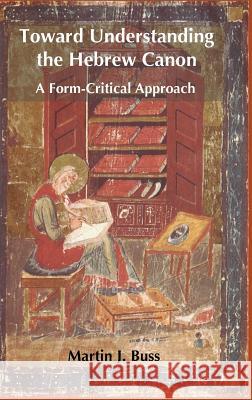Toward Understanding the Hebrew Canon: A Form-Critical Approach » książka
Toward Understanding the Hebrew Canon: A Form-Critical Approach
ISBN-13: 9781909697164 / Angielski / Twarda / 2013 / 210 str.
Toward Understanding the Hebrew Canon: A Form-Critical Approach explores in an original and reflective way the relations between the linguistic forms, ideas and life involvements of biblical genres. The various forms of the Hebrew Bible reflect and correspond to the richly diverse life experiences of the Hebrew people, which include varied legal, cultic and erotic interactions. Divine speech is a prominent literary form in the Hebrew Bible, according to Buss's analysis. It has an emotive character, and is highly personal. Such speech establishes a series of Origin events that run from creation to the foundation of kingship; it both provides norms for life and struggles with human recalcitrance. Divine speech also provides evaluative assessments of present and envisaged situations, and it promises a truly good End. The humans to whom divine speech is directed are called on to acknowledge the divine reality, which they can do through self-transcendence, as a part of selfhood. In ethics, a receptive attitude acknowledges the unconditional worth of others, which is supported by Deity. Human speech is usually also emotive, although on occasion it is concerned rather with dry historical actualities. It is intertwined with divine speech in narratives and prophecies. In these fourteen essays (one of them previously unpublished) the renowned biblical scholar Martin Buss gathers an array of his work from many years, bringing to bear on the Hebrew Bible his extensive researches in cross-cultural data and in other disciplines such as philosophy and social psychology.











